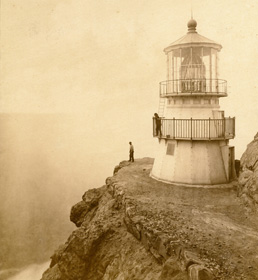Paul Duclos, as many of our readers know, is a pen name. Eadweard Muybridge is a “photo name” used by Edward Muggeridge with considerably more success.

Photo of Pigeon Point Lighthouse, 1873, from the catalogue “Helios: Eadweard Muybridge in a Time of Change.”
By Paul Duclos
Published: April 1, 2011
Organized by the Corcoran Gallery of Art in Washington, D.C., “Helios: Eadweard Muybridge in a Time of Change,” provides viewers with an enchanting panorama of captured motion. Having settled in San Francisco just after the Civil War, the British native anticipated cinema with the invention of “zoopraxiscope,” a projector of moving pictures. Known chiefly as a photographer who shot racing horses, he also did portraits and landscapes—memorably set in our fair city.
The catalogue constructs a new understanding of Muybridge’s innovations and demonstrates his influence in modern photography. Featured are countless photographs, along with insightful essays by Philip Brookman, Marta Braun, Andy Grundberg, Rebecca Solnit and SFMOMA Photography Curator Corey Keller. 2010; hardcover; 335 pages.
Samuel Clemens might never have attained the same notoriety had he kept his given name either. Having brought with him to San Francisco the authorial moniker Mark Twain, he went on to a fabled career as a writer and lecturer.
“I’ve struck it!” Mark Twain wrote in a 1904 letter to a friend. “And I will give it away—to you. You will never know how much enjoyment you have lost until you get to dictating your autobiography.” Thus, after dozens of false starts and hundreds of pages, Twain embarked on his “Final (and Right) Plan” for telling the story of his life. His innovative notion—to “talk only about the thing which interests you for the moment”—meant that his thoughts could range freely. The strict instruction that many of these texts remain unpublished for 100 years meant that when they came out, he would be “dead, and unaware, and indifferent,” and that he was therefore free to speak his “whole frank mind.”
The year 2010 marks the 100th anniversary of Twain’s death. In celebration of this important milestone and in honor of the cherished tradition of publishing Mark Twain’s works, UC Press is now offering for the first time Mark Twain’s uncensored autobiography in its entirety and exactly as he left it. This major literary event brings to readers, admirers and scholars the first of three volumes and presents Mark Twain’s authentic and unsuppressed voice, brimming with humor, ideas and opinions, and speaking clearly from the grave as he intended.
Jessica Molaskey wouldn’t change her name after marrying John Pizzarelli, but not because she didn’t love him. “He’s an Italian Catholic and I’m an Irish Catholic, so it would have just been a lateral move,” she declared to the audience at the Venetian Room at the San Francisco Fairmont last month.
Having recorded over 20 albums, the most recent a tribute to Duke Ellington, and currently hosting a music-themed radio show Radio Deluxe, Pizzarelli and Molaskey blend musical genres seamlessly and intelligently. Thanks to Bay Area Cabaret, they were provided with a splendid local venue for a one-night, two-set version of their Café Carlyle show.
Winners of New York’s coveted Nightlife Award, jazz guitarist and former RCA bandleader Pizzarelli and Broadway star Molaskey (Tommy, Sunday in the Park with George) said they’ll be back. One hopes that promise will be kept, and soon.

